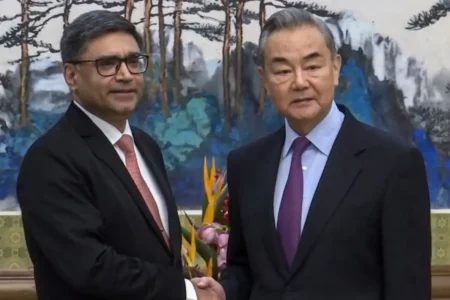India-China Relations: In a significant development towards fostering peace and cooperation, Chinese Foreign Minister Wang Yi emphasized the need for mutual understanding and avoiding alienation during his meeting with Indian Foreign Secretary Vikram Misri on Monday. This meeting comes as part of ongoing efforts to de-escalate tensions along the Line of Actual Control (LAC) and normalize India-China relations, which have been strained for over four years.
Wang Yi stressed that India and China must “meet each other halfway” and commit to building a foundation of “mutual understanding [and] mutual support.” According to a statement from China’s foreign ministry, he urged both nations to steer clear of “mutual suspicion [and] mutual alienation” while focusing on their shared goals.
Strengthening Bilateral Ties for Global Impact
The Chinese foreign minister highlighted that the improvement of India-China relations aligns with the fundamental interests of both nations. He pointed out that stronger ties between the two countries would significantly contribute to protecting the legitimate rights and interests of the Global South, a group of developing nations whose voices have often been underrepresented in global affairs.
Since the breakthrough understanding reached in October 2023 regarding the disengagement of forces at the friction points of Demchok and Depsang, both nations have taken concrete steps toward mending relations. The meeting between Prime Minister Narendra Modi and President Xi Jinping shortly thereafter was a crucial turning point, underscoring the commitment of both leaders to restoring peace and stability.
Renewed Dialogue and Key Developments
In recent months, India and China have revived several diplomatic mechanisms to address long-standing issues, particularly the border dispute along the LAC. National Security Adviser Ajit Doval’s visit to Beijing in December for discussions with Wang Yi marked an important milestone, as this was their second meeting in less than five months.
Despite progress, India has maintained a cautious approach, especially regarding China’s push for easing visa restrictions and resuming direct flights that have been suspended since 2020. China’s suggestion to place the border issue in its “appropriate place” within the broader framework of India-China relations indicates its desire to advance trade and investment ties alongside resolving territorial disputes.
Focus on Cooperation and Exchanges
During the discussions, the two sides reached an agreement to prioritize cross-border cooperation and exchanges. This includes resuming the Kailash Mansarovar Yatra, a pilgrimage that has been halted for four years, and enhancing data sharing on trans-border rivers. These measures aim to rebuild trust and create an atmosphere conducive to further dialogue.
The Kailash Mansarovar pilgrimage holds spiritual significance for many Indian pilgrims, and its potential resumption is expected to figure prominently in Misri’s talks with China’s Vice Foreign Minister Sun Weidong. Other key areas of discussion include confidence-building measures and steps to reduce military tensions in the Ladakh sector of the LAC.
Also Read:New Zealand’s Relaxed Visa Rules Transform It Into a Digital Nomad Hub
